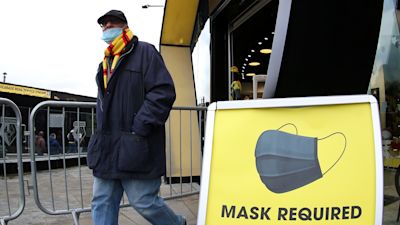Covid: PM sticks with Plan B in bid to ‘ride out’ Omicron with no further restrictions announced

ITV News Health Editor Emily Morgan speaks to an intensive care doctor about the situation in hospitals as several trusts declare critical incidents
England is expected to remain under Plan B coronavirus restrictions for at least three more weeks, the prime minister has confirmed, with the review date still set for January 26.
Boris Johnson said he would not be imposing further restrictions to tackle the massive wave of Omicron cases, despite acknowledging the NHS was moving to a "war footing" and that some services will be “temporarily overwhelmed.”
“I would say we have a good chance of getting through the Omicron wave without the need for further restrictions and without the need certainly for a lockdown,” he said.
Boris Johnson accepted that the coming weeks will see Covid-19 cause significant disruption to hospitals, schools and the economy, but insisted there is nothing in the data that requires moving up from Plan B.
Instead, a requirement for daily testing has been announced for critical workers to minimise the impact of Omicron on essential services.
It will apply to workers in civil, nuclear and other power generation, air traffic control, meat processing and food supply chains.
Those workers will be sent test kits for every working day from Monday, January 10, Mr Johnson said.
Staff sickness caused by Covid is hitting rubbish collection services and supermarkets as businesses call for the isolation time to be shortened, ITV News Deputy Political Editor Anushka Asthana reports
The booster jab scheme is the best way to protect the UK, he said, urging the nine million people eligible for their third jab to come forward, with two million appointments available this week, the PM said.
The announcement that Plan B will remain in force flies in the face of calls from the Royal College of Nursing, which has been calling for the government to take a "more cautious approach" to coronavirus restrictions, "without further delay".
Under Plan B, people in England are required to wear face coverings in most indoor locations and provide proof of their Covid status before entering large venues.
Mr Johnson added that the government will continue to "watch what happens very closely", but noted: "We think that this is the right approach to take. It's a balanced approach."
"We have a chance to ride out this Omicron wave without shutting down our country once again," the prime minister said, but he warned it would be "profoundly wrong" to think the pandemic is over.
Hospitals are facing a "perfect storm" as stretched NHS work forces don't have the capacity to deal with another wave of Covid, explains ITV News Health Editor Emily Morgan
He told a Downing Street press conference that while the Omicron variant is much more transmissible it is much milder than other strains such as Delta.
But, highlighting the extremely high infection rate, he said: "Previous waves of the pandemic didn't have a single day with more than 100,000 new cases reported, one day last week we had 200,000 people test positive.
"And the latest figure today is another 218,000, though that includes some delayed reports.
"So anyone who thinks our battle with Covid is over, I'm afraid is profoundly wrong. This is a moment for the utmost caution."
High infection rates are "not yet" translating into high numbers of patients requiring intensive care, Mr Johnson said, "thanks to the fantastic national effort to get Britain boosted".
Listen to the ITV News Coronavirus Podcast:
Chief Medical Officer Chris Whitty said the vast majority, 90%, of those in Intensive Care Units have not had their booster jab and 60% of those have not had any jab at all.
He added: "We now have confidence that the booster provides around 88% overall protection against being hospitalised and it is likely to be even greater than that for severe disease and mortality."
Critical incidents have been declared at several NHS hospital trusts in the past five days over severe staff absences caused by Omicron putting large numbers into self-isolation, demonstrating the fast rate at which it spreads.
But Mr Johnson resisted pressure to reduce the self-isolation period to five days, as has been done in the US, insisting the safest timescale is seven days.
Three hospital trusts in England and one in Wales confirmed critical incidents on Tuesday.
Bosses at Derriford Hospital in Wales said there were 500 staff members off work for Covid-related reasons.
It came after United Lincolnshire and Morecambe Bay announced critical incidents over the bank holiday weekend - two more trusts are thought to have the same status after an NHS boss said there were at least half a dozen in total.
The first was confirmed by the United Lincolnshire Hospitals NHS Trust, with an internal letter warning it is "unable to maintain safe staffing levels", leading to "compromised care".
Pressed on whether further Covid measures would be necessary to protect hospitals, the PM said: "If you ask me to guess, I would say we have a good chance of getting through the Omicron wave without the need for further restrictions, and without the need certainly for a lockdown.
"And the reason we are in that position, unlike many other countries in the world, certainly like many other countries in Europe, is that we just have such a high level now of booster protection, but that is no reason for everybody not to get more."